This past few years I've explored more Canadian authors; especially Mystery writers, as I've branched more and more into that genre. I love a well-crafted mystery. There are many wonderful and talented Canadian mystery writers. I'll list a few of my favourites in the latter portion of this Blog entry.
This year as one of my Goodreads reading challenges, I decided to explore Canadian writers, so my 12 + 4 Reading challenge was made up only of Canadian authors. I finished that fairly quickly and am now about half way through an add-on 12 + 0 Reading challenge, once again focussing solely on Canadian authors.
So with that as a frame of reference, I've decided to add my Top Ten List of favourite Canadian books. Please recognize that my frame of reference probably isn't all that deep, but I think the list highlights some excellent books and writers. So here we go, from #10 to #1, my Top Ten Canadian books.
10. Scar Tissue by Michael Ignatieff (Fiction) - I read this book as one of my recent challenges. I found it in a book about another authors favourite Canadian writers. I was glad to have attempted the book. It tells the story of a man's coping with the mental deterioration of his mother. A very powerful story. Below was my review of the book.
"Scar Tissue, in its simplest form, is the story of a man trying to deal with his mother's descent into mental incapacitation through what I presume is Alzheimer's, although that name isn't specifically used. It's the story of his relationship with his father, mother, brother and wife and family as the disease progresses and of his ability or inability to cope with it and them. In some ways, it's a very straightforward story but at the same time, it can strike many chords with the reader. There were many moments when it reminded me of my own mother's struggles with Alzheimers and it made me respect my father and sister's constant caring for her, while I, who lived across the country, only visited once or twice a year. It's a very short story but an excellent one."
9. Player One: What is to Become of Us by Douglas Coupland (Science Fiction) - This was another of the books mentioned in Hooked on Canadian Books (It's given my many ideas for books to read) and one that I enjoyed very much. Coupland was a new author for me. I may have to check out some other books by him.
"The synopsis of this book compares the style to Kurt Vonnegut and J.G. Ballard. I can see that somewhat, especially JG Ballard. However, I find the characters more sympathetic and easy to relate to than those in the Ballard books I've read up to now. I also can compare the story and feeling somewhat to Emily St Mandel's Station Eleven, without the scope of her story.
In Player One, you have basically 4 people; Rick, Karen, Rachel and Luke and also the narrator, a computer game voice of Player One, all trapped in an airport cocktail lounge by a world-wide crisis. This crisis involves the sudden drastic increase in the price of oil and a series of explosions, etc. The four are in the cocktail lounge for various reasons; Rick as the bartender, Karen, just having flown in to meet an internet companion to see if they can strike up a relationship, Rachel, trying to meet a man to make her feel human and Luke, a parish priest on the run. Player One is the unseen voice, elaborating on the events of the previous hour and expounding on what will happen in the next.
The story is set over 5 hours and in each hour, the four humans and Player One tell what they are thinking and what is occurring. It's an interesting concept and each person is well-crafted for such a short timeframe and the story is engrossing and draws you in. I could easily have given this a 5-star rating, but I think a solid 4 is fair. I enjoyed this story very much and found myself being drawn back to it to see how it would all resolve. Excellent and surprisingly good."
8. Sunburst by Phyllis Gotlieb (Science Fiction) - I bought this in Victoria a few years back. I think I found the book listed at the back of another I was reading. I checked out Gotlieb online as she was a new author for me and was nicely surprised to find out she was Canadian. This book was a lovely surprise and since reading it, I've enjoyed 3 or 4 more of Gotlieb's unique Science Fiction. She is worth checking out. The book's synopsis is below.
"The dumplings were children. They couldn't tell right from wrong, or keep themselves clean; but they could fly or float on the wind, freeze a river or fry a man alive. Hideously mutated reminders of a nuclear explosion, they were kept hidden from an unsuspecting world in a secret electronic 'dump' that even their terrifying Psi powers couldn't penetrate. Until the night they decided to go out and play."
(You might also like to check out; O Master Caliban, A Judgement of Dragons, Emperors, Swords and Pentacles and Son of Morning and Other Stories.)
7. Paris 1919 - Six Months that Changed the World by Margaret MacMillan (Non-Fiction/ History) - I read this during a deployment to the Middle East in 2005. I had enjoyed Barbara Tuchman's The Guns of August a couple of times and the premise of this book sounded very interesting. It didn't let me down. The book covers the Peace conference after World War I and introduces the fascinating group of individuals who made the decisions that still impact the world to this day. MacMillan is an excellent writer and explains historical events in such a manner that make it interesting and informative. A fascinating period of history and an excellent book. I've since read her The War that Ended the Peace - The Road to 1914, which covers the build-up to WWI and the events and personal actions and beliefs that lead the world to War. If you read the 3 books listed above, you will be totally informed about this period.
6. The Soft Talkers by Margaret Millar (Mystery) - Millar is a Canadian - born mystery writer who I discovered a few years ago. She was married to another mystery writer, Ross MacDonald, the author of the Lew Archer mystery books. Millar tended to write standalone mysteries and as I've searched for her books, I quickly discovered how difficult it was to find copies of them. I have managed to find a few of her books and enjoyed the ones I've read so far very much. Beast in View and Rose's Last Summer were both excellent. Beast in View was also a 5-star read, but I chose The Soft Talkers in my list of Top Tens. I think either would have been acceptable. This was my review of the book.
"I've read a couple of Margaret Millar's stories before; they can be hard to find. I enjoyed them quite a bit, as she has a very accessible writing style. The Soft Talkers, also published under the name An Air That Kills, was a pleasure to read. It was a perfect little mystery.
Millar has such a smooth writing style, even little details like "she buttoned up her sweater to the very top", fill the story and make it even better. The story basically deals with the disappearance of Ron Galloway, who is supposed to meet his buddies at a cabin he owns north of Toronto, Ontario, Canada. He never shows up and the rest of the story deals with the follow-on reactions of his friends and family and the follow-on search for him.
The story is told from the perspective of his various friends and of his wife and there are also even small sub-stories by side characters. Even these sub-stories are interesting and so well-written. It's a story that I just enjoyed reading and the ending had a nice surprise that I actually didn't see coming. Being Canadian, I enjoyed the setting; the city of Toronto and cottage country north of Toronto. The story was written in 1957 and in some ways reminds me of some of the Patricia Highsmith stories I've read, just better. Such a simple but entertaining book; clear, concise and intelligently written. I highly recommend."
5. Anil's Ghost by Michael Ondaatje (Fiction) - Back in my university days, I read The Collected Works of Billy the Kid by Ondaatje, a book of poetry that I actually recall enjoying, which says something as I'm not a Poetry person. That was my experience of Ondaatje's work until I saw a copy of Anil's Ghost in one of my local book stores a few year's back. The story follows Anil, a Sri Lankan, who had left her country to study medicine in England and returns to her native land as a forensic pathologist, a Human Rights investigator working for the UN. Sri Lanka is buried under civil war and atrocity. Anil must work in this dangerous, life threatening environment, escorted by a local archeologist, Sareth, in her work. The story mixes a constant ominous, threatening atmosphere with a budding relationship between Anil and Sareth. The story is fascinating, with an exotic locale and environment and containing interesting, well-developed characters. I've since read Ondaatje's In the Skin of a Lion, set in Toronto and enjoyed it very much as well.
4. A Fine Balance by Rohinton Mistry (Fiction) - Over the course of three or four years, I read A Fine Balance, Family Matters, Such a Long Journey and Tales from Firozsha Baag by Indian born Canadian, Rohinton Mistry. Either of the first three books could have been in my Top Ten, but I chose A Fine Balance of the three. Mistry spins such interesting stories of his native India, tales dealing with tragedy, poverty, struggles to survive, but also intertwined within the context of the stories are wonderful characters who seem to find positives and hope within their struggles. I've never been to India and knew little of its culture or history, but there are many granules to grab onto within these stories. Mistry has been awarded many prizes for his fiction and having read the above stories, I can clearly see why he has. He is an author who deserves to be read.
3. Station Eleven by Emily St. John Mandel (Science Fiction/ Dystopic Future) - Station Eleven was a break-thru book for Emily St. John Mandel and I can see why. I loved this story and had difficulty putting it down once I got into it; a challenge when I usually have three or four books on the go at any one time. It reminds me of Cormac McCarthy's The Road, but maybe not with such a depressing outlook. The book moves between the past and the present, following mainly a group of actors and musicians as they travel around Ontario in the aftermath of a worldwide cataclysm. Mandel also follows the core individuals in the past, linking their lives slowly as the days move inevitably to the collapse. I loved the characters and the story and I think, in the right hands, it would be a fascinating movie. This was my review.
"I loved Station Eleven. It was one of those books that I wanted to finish to see how it ended, but, at the same time, I wanted to continue exploring the lives of the characters. Does that make sense?
It brought out so many emotions; sadness, anger, tears (in both a good and bad way), happiness, encouragement, etc. In some ways it reminded me of The Road by Cormac McCarthy, but it wasn't so consistently dour and scary. Probably part of the reason for that may be that Station Eleven had more characters and it also didn't just situate itself solely in the dystopic (am I spelling this right?) future.
I particularly liked how the story moved along, starting in their present (our future), introducing the Travelling Symphony and highlighting the new way of life of people trying to survive, then wandering to other characters, explaining where they were when the Georgia Flu caused this world-wide destruction and following their adjustments to the post-flu life.
I liked how the main characters are slowly linked up, such as how Kirsten came to be in possession of Miranda's comic, Station Eleven, even how this comic may have impacted The Prophet. The Prophet introduced a very scary element into the whole story. Was he not utilized enough? Maybe but, personally, I think his appearances were just sufficient enough to provide a negative counterpoint to those trying to live safe lives. More of him might have put a completely different tone to the overall story. How people coped with this new future is what was most interesting.
There were so many nice touches. I liked Kirsten especially but every character was excellent and their personalities developed just to the right amount. I could go on and on. Suffice it to say, it's an excellent story and well worth reading. I think the ending left the story open - ended enough to provide a continuation story to show us how the future continues to unfold, should Emily St. John Mandel so desire. Maybe?? Please.. "
2. The Lyre of Orpheus by Robertson Davies (Fiction) - The Lyre of Orpheus is the third book in the Cornish trilogy; the other books being The Rebel Angels and What's Bred in the Bone. I enjoyed the complete trilogy and could have as easily made The Rebel Angels my Number 2 top book, as if I hadn't enjoyed it, then I wouldn't have finally made it to this excellent third book. This is the 2nd trilogy of Davies' books that I've experienced. The first I read back in the mid-70's, that being The Deptford Trilogy, which was also very enjoyable. Like most trilogies, the 2nd book in both was the weakest, at least in my opinion. In the Cornish trilogy, we follow the Cornish family and friends; the stories are both mysteries and historical in nature. Davies has a lovely way of writing, drawing you with intelligent, often humorous and interesting stories. If you like magical stories, try the Deptford trilogy, if you like art and drama, try the Cornish trilogy. For that matter, try them both. You can't lose with either. Here was my review of this book.
"This is the 3rd book in the Cornish trilogy. I enjoyed the first, The Rebel Angels, very much. It had been most enjoyable to get back into Robertson Davies. The second book, What's Bred in the Bone, while interesting, didn't hold the same level of enjoyment that the first did. So The Lyre of Orpheus had sat on my shelf for a couple of years now.
I'm so glad that I finally dusted it off and got back into this trilogy. It was excellent. I loved everything about this; the writing, the characters, the story. The basic story is that the Cornish foundation, run by Arthur Cornish and his lovely wife, Maria, and assisted by a loose collection of directors, agrees to use Cornish foundation money, to fund the doctoral work of a young music student, Hulda Schnakenburg. She is trying to complete an unfinished opera by Hoffman, the Story of Arthur of Britain. A concurrent story has Simon Darcourt, old friend of Francis Cornish and of Arthur and Maria, seeking to complete a biography of Francis Cornish.
The investigation into this biography, to find out the missing middle of Francis' life and the development of the opera, are both fascinating stories. The characters, from the main ones, as well as Schnak and the others brought in to help with the creation of the opera, were lovingly written and so interesting. I won't say I'm an opera fan, but watching the creation and development and the ultimate presentation of this opera, was a joy to read. Throw in asides by ghostly Hoffman, throughout the story, as he watches from Limbo and waits to see what the ultimate result will be, and you've got a wonderfully rich story. Sex, cuckoldry and just downright entertainment, a truly fantastic, wonderful story. A perfect ending to this trilogy."
1. The Handmaid's Tale by Margaret Atwood (Science Fiction/ Dystopic future). The Handmaid's Tale has long resided in my overall Top Ten books of all-time list. I've had a fairly long experience with Margaret Atwood's works; reading Surfacing and The Edible Woman back in my university days. I tried a collection of her poetry as well, that being The Circle Game, and for one who doesn't normally like poetry, I think I recall enjoying hers. Since that time, I've also read The Blind Assassin, a fascinating story and have engrossed myself in her Oryx and Crake trilogy, another excellent collection of dystopic fiction, especially the last book, Maddaddam, which I loved. However, I have to go back to The Handmaid's Tale as my number 1 book of Canadian literature. I've read a few times and enjoyed each and every time. It tells a story of a not-so-distant future, maybe one that strikes a chord as we hear of groups like ISIS and the Tea Party, who want to control everyone's lives, especially those of women. I haven't ever written a review of the book, as I read it before I got involved in Blog's and Goodreads, but below is the synopsis. If you like books of the future, this is well-worth reading.
"First published in 1985, The Handmaid's Tale is a novel of such power that the reader is unable to forget its images and its forecast. With more than two million copies in print, it is Margaret Atwood's most popular and compelling novel. Set in the near future, it describes life in what once was the United States, now called the Republic of Gilead. Reacting to social unrest, and a sharply declining birthrate, the new regime has reverted to -- even gone beyond -- the repressive tolerance of the original Puritans. Offred is a Handmaid who may leave the home of the Commander and his wife once a day to walk to food markets whose signs are now pictures instead of words because women are no longer allowed to read. She must lie on her back once a month and pray that the Commander makes her pregnant because she is only valued as long as her ovaries are viable. Offred can remember the years before, when she lived and made love with her husband, Luke; when she played with and protected her daughter; when she had a job, money of her own, and access to knowledge. But all of that is gone now."
So there you go, my Top Ten Canadian books. I was going to continue this thread with my list of favourite Canadian mystery writers, but this has taken longer than planned. Besides, it'll give me something to write tomorrow.
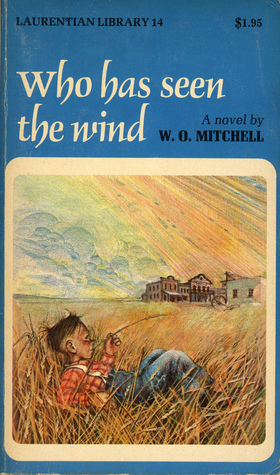


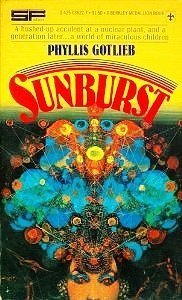




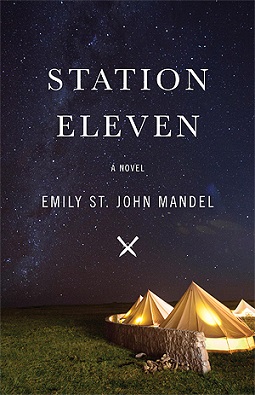
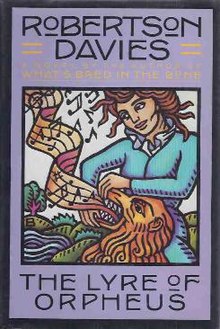
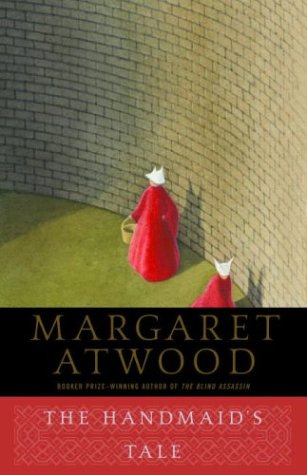
No comments:
Post a Comment